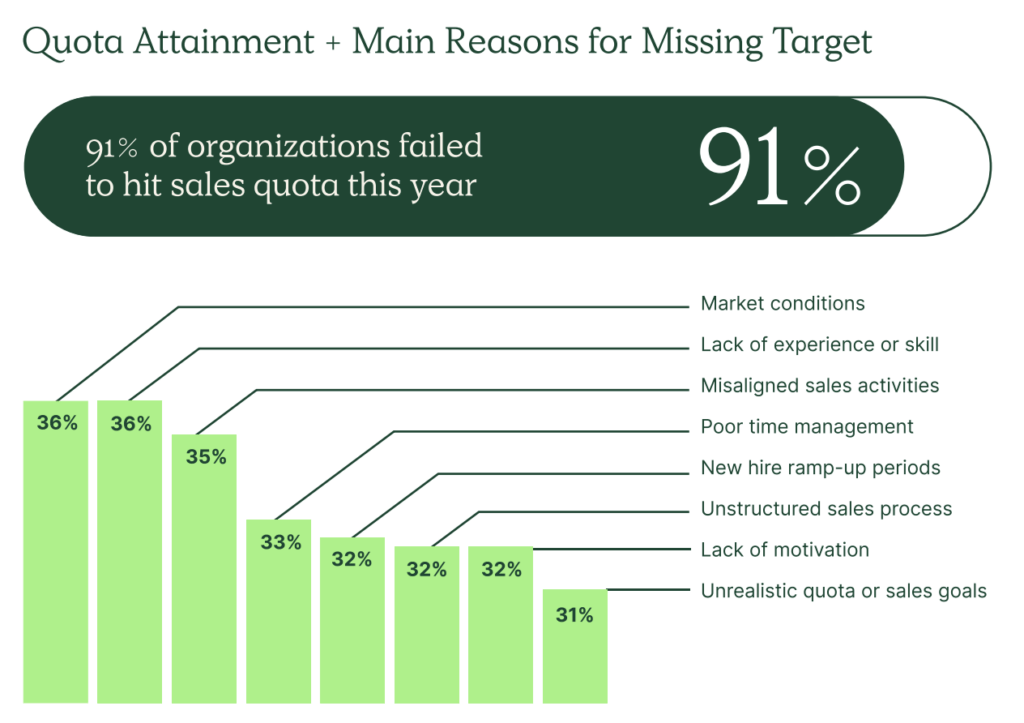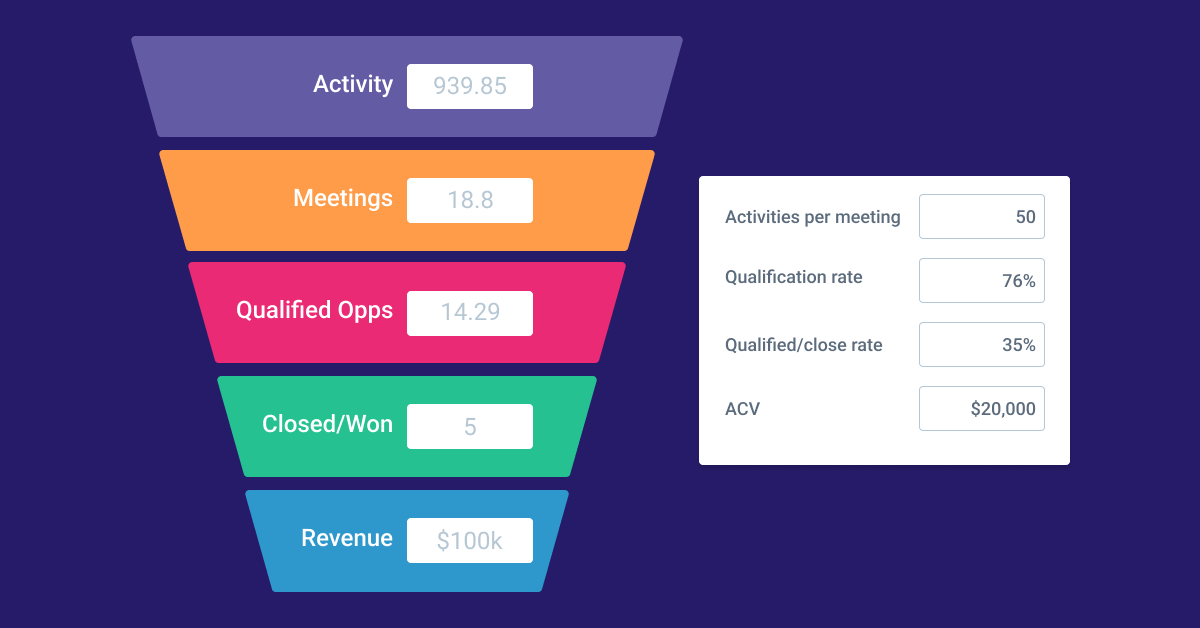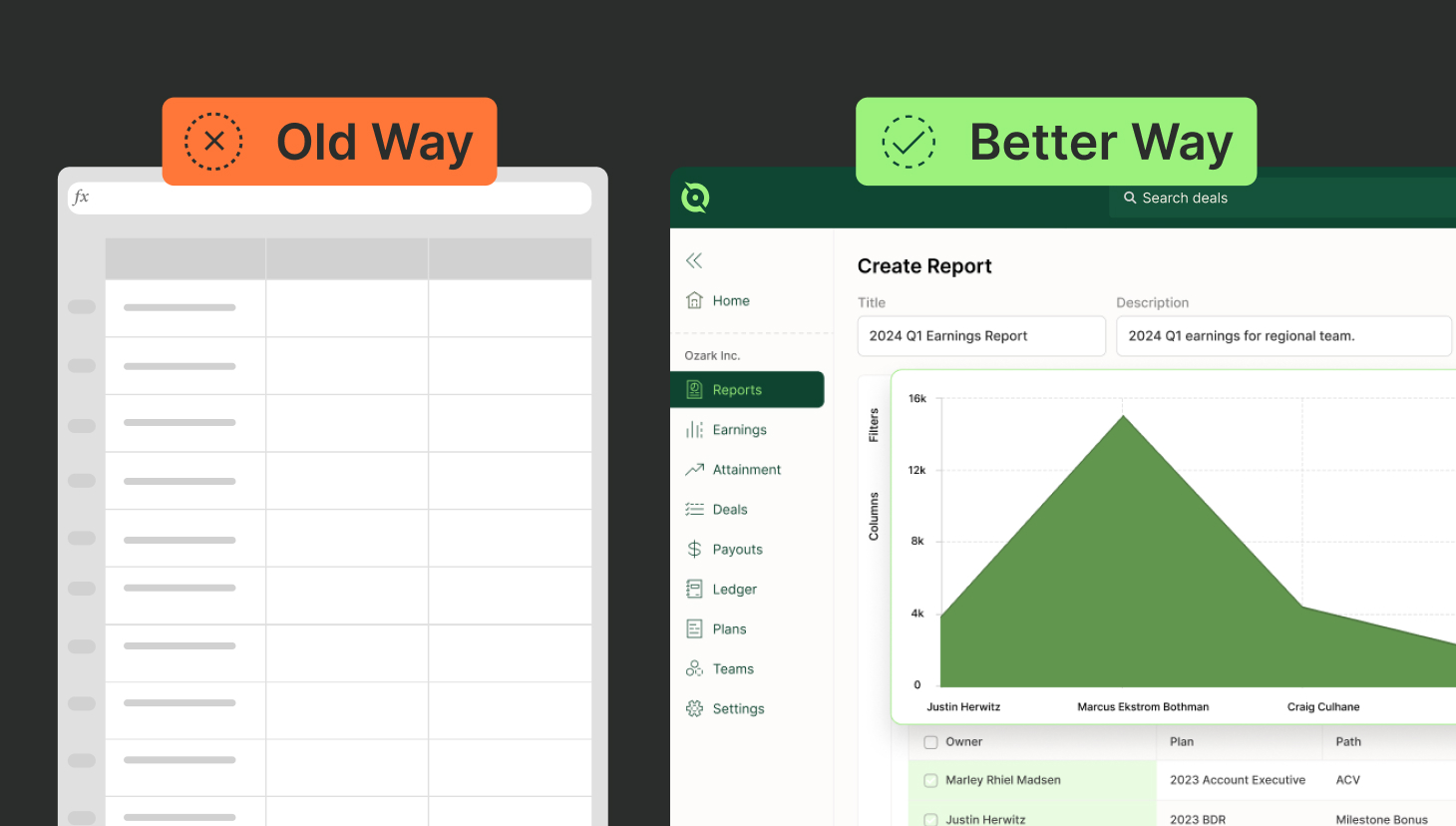In our 2024 Compensation Trends report, “Solving the Biggest Sales Compensation Challenges: Insights from 450+ Finance, RevOps, and Sales Leaders,” leaders reported that 91% of them are failing to hit sales quota expectations this year.
This report reveals insights from a survey of over 450 RevOps, Finance, and Sales Leaders from the United Kingdom and the United States. Participants included directors, VPs, and C-level executives at tech-adjacent and SaaS companies. The survey was conducted during the first half of 2023 to investigate the impact of misaligned and poorly executed compensation plans.
In this report, we set out to:
- Determine where the disconnect between Finance, Sales, and RevOps Leaders originates.
- Understand issues encountered by organizations throughout the compensation plan design process.
- Expose the largest gaps in commission management.
- Provide advice on how to prepare for comp plan success in 2024.
The survey exposed common compensation issues, including a lack of confidence in comp plan performance, sales reps not understanding how they earn commissions, and 100% of revenue leaders admitting to the need for comp plan improvements.
Every challenge leaders referenced previously in the report — misalignment to business goals and between teams, complexities of plans, failure to drive rep motivation — often results in missed quotas and targets.
Our survey found that 91% of companies fail to achieve 80% or more of their quota targets.
Below, we share what leaders credited these misses to.

Market conditions
Failure to adjust comp plans as your strategies change in response to the market influences your sales team’s ability to achieve targets.
Market volatility in 2023 caused SaaS businesses to shift from a “grow at all costs” mentality toward business efficiencies.
It started with the first quarter of 2023, when deal count and raised capital dropped 45%, marking the slowest period since 2017.
Then, organizations changed the key performance indicators (KPIs) they were tracking to show investors a healthy business model. They started monitoring metrics currently of greater importance to investors because they offer a more direct path to profitability. These KPIs include customer lifetime value, customer acquisition costs, and gross revenue retention.
However, tracking the right metrics alone doesn’t do the job. These companies failed to boost predictable retention without adjusting their sales compensation plans to reflect their new focus. The simple inclusion of compensation levers to promote the right activities is all they need.
Lack of experience or skill
Another cause of missed quotas is a lack of experience designing plans (24%), the third biggest challenge cited by survey participants.
This can lead to common sales compensation errors like overly complex plans, failure to align plans with business objectives, using outdated data, and duplicating another company’s plan.
Our survey revealed overcomplicated plans as a common issue, making aligning teams and gaining adoption harder.
Avoiding too much complexity is essential; otherwise, you risk sales rep confusion and demotivation, which is the opposite of what your plan should accomplish.
Signs that your comp plan is too complex include reps’ confusion about how they earn commissions, a continual need to add SPIFs to drive behaviors, and taking longer than 1 minute to explain it.

Build a Sales Funnel
Use our free sales funnel resource to see how many meetings your team needs to book to hit quota.
Calculate NowMisaligned sales activities
A properly designed compensation plan drives sales activities that align with and drive business objectives.
“You have to eliminate any disconnect between the business’s performance and your team’s performance,” said QuotaPath Sr. Director of RevOps Ryan Milligan.
The following misaligned sales activities hinder your team’s ability to hit their goals and should be avoided:
- Reps push a product they’re used to selling vs. a newer one with a better product market fit.
- Outbound efforts target industries, company sizes, and existing tech stacks that slow down sales cycles and are harder to sell.
- Reps chase unqualified leads because the potential deal size is larger.
- The team focuses on the wrong metrics, trying to push ARR at a grow-at-all-costs measure vs. taking a strategic approach to winning ICP deals (ideal customer profile) with shorter sales cycles and more likely to close/win.
Sales activities thwart efforts to boost desirable business KPIs by decreasing the odds of customer retention, shortening customer lifetime value, and increasing customer acquisition costs.
Poor time management:
Another key factor preventing reps from hitting their numbers is poor time management practices like:
- Spending too much time researching prospects
- Failing to set time for outbound prospecting.
- Neglecting CRM updates
- Not conducting follow-ups
- Investing too much time on poor-fit prospects who don’t fit your ICP.
Practicing effective time management boosts rep productivity and results.
New hire ramp-up periods
New hires need time to reach total productivity and aren’t yet equipped to hit the quota of more established reps on the team. Failure to adjust the quota for these reps makes them fall short.
Sales reps who lack experience or skills aren’t as productive as their fully onboarded and experienced counterparts. So, when you add new reps to your sales team, the hiring and ramp process significantly decreases productivity.
A leader takes an average of 30 days to find and hire a new salesperson, and it takes an additional 90 days of ramp time before they can start selling deals. Then, according to Rain Group, it takes an additional nine months for reps to be fully productive and 15 months to become top performers.
To offset this, add management by objectives (MBOs) in your new hire ramp plan that promote behaviors that will help them be successful faster and give them a fair shot at achieving OTE. For instance, you could reduce quota, keep commission rates intact, and provide other ways for the new reps to hit OTE, such as completing training or a prospecting goal.
Unstructured sales process
A sales process that lacks structure is a huge obstacle to reps hitting quota.
A structured sales process delineates what needs to be done at each sale stage and includes clearly defined steps and milestones. It guides reps as they advance the sale from prospecting to presenting to offer to close, increasing the odds of success by preventing deals from slipping through the cracks.
Failing to set up a sales process hurts productivity and gives sales reps a huge disadvantage. Asking them to work in an unstructured sales process like this leaves them constantly trying to figure out what to do next. Some of your reps may find their way, but you’re setting most of them up to fall short of targets.
Lack of motivation
Motivating your sales team is one of the core key elements of a sales compensation plan, and when that’s not happening, this indicates a flawed compensation strategy.
Address lack of motivation by confirming your reps understand their comp plan and how they are paid. You can achieve this by leveraging a survey or providing your reps multiple opportunities to ask questions about their incentives. These are also great ways to gather feedback on their incentives and learn how they are motivated.
Another way to cultivate motivation is by giving your sales reps easy access to views into their earnings. They can translate their pipeline into potential commissions using a tool like QuotaPath to display forecasted earnings and attainment through Team Leaderboards.
Calculate OTE:Quota ratios
Use this free calculator to ensure your reps’ on-target earnings and quotas mirror what they’re bringing in for the business.
Try it NowUnrealistic quota or sales goals
Company objectives typically change with market and financial shifts. Comp plans must be adjusted and aligned with business goals to promote sales behaviors that drive these new objectives.
As market conditions shifted in early 2023, we didn’t see companies adapting their sales compensation plans to align with evolving business objectives. This has resulted in reps at many companies falling short of sales goals.
Unrealistic quotas and sales goals, especially on-target earnings, can be challenging to set and adjust. Use our free Quota:OTE ratio calculator to take the guesswork out of this process. It measures the health of your targets against your team’s historical performance while determining if they are too easily attainable.
Address comp plan challenges
Compensation plans can be used to address these common reasons for sales teams missing quotas. This is especially true regarding sales activity alignment, motivating reps, ramp-up periods, and structured sales processes.
Looking for more ways to solve compensation plan challenges? Download the full report or chat with our sales team on sales compensation management improvements using QuotaPath.



